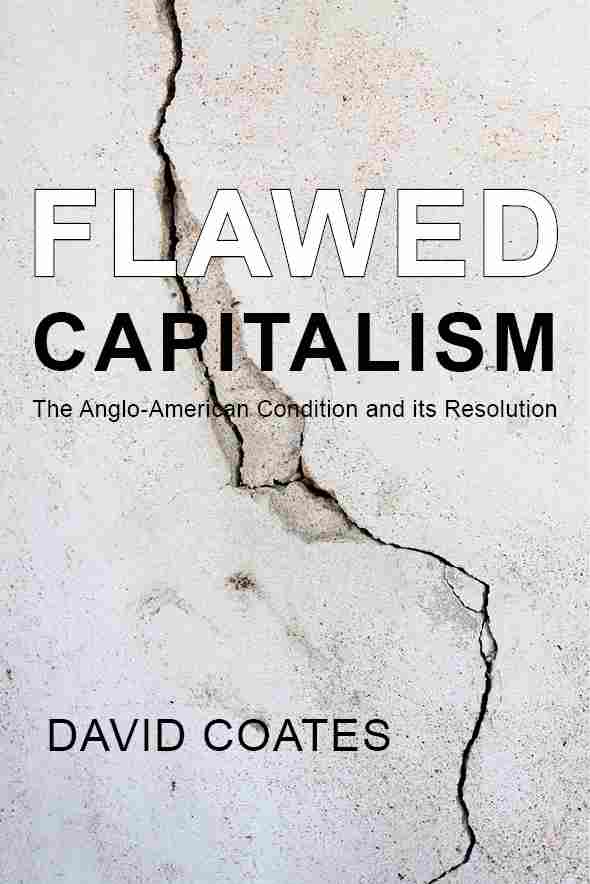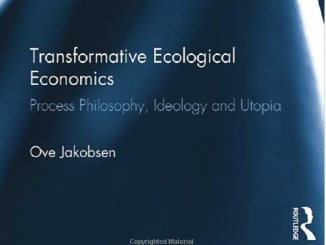 Book review by Scott Lavery
Book review by Scott Lavery
Global orders rise and global orders fall. That much we know. The difficult questions arise when we examine those moments of transition between phases of capitalist development. The post-crash world embodies one such moment. It is replete with difficult questions. Are we currently witnessing the end of US global leadership? Has the 2008 crisis fundamentally re-shaped capitalism and geo-politics? What is the future of globalisation and the liberal world order?
David Coates’ latest book, Flawed Capitalism, places these questions in their historical context. It focuses on those two core states – the United States and the United Kingdom – which have been key architects of global capitalism in the 20th century. The book advances an erudite diagnosis of what Coates terms the ‘Anglo-American condition’, a deep malaise which threatens to destabilise the global order. Panoramic in its perspective and meticulous in its empirical detail, this is required reading for anyone interested in the entrenched pathologies of capitalism’s Anglophone heartlands.
The historical narrative follows the ‘rise’ and ‘fall’ of two eras of US hegemony, with parallel chapters tracing the development of the UK under ‘the American shadow’. The first phase of US ascendancy was codified in the ‘post-war settlement’, when the US emerged as the undisputed centre of power in the Western world. The US Treasury and Wall Street became the de facto guarantors of the Bretton Woods settlement, backing the system of fixed exchange rates pegged to the dollar, (limited) capital controls and relatively free trade between the Western bloc of capitalist nations. This framework produced an era of political stability and unparalleled economic expansion. Dollars flowed across the Atlantic – in the form of Marshall Aid, US Treasury bonds and American private investment – fuelling the economic growth of beleaguered Western states whilst consolidating the anti-Soviet military alliance on Europe’s eastern flank.
The success of this first era of US hegemony led, ultimately, to its demise. By the 1970s, exports from the rapidly re-industrialised Germany and Japan had penetrated the US domestic market. American competitiveness waned. But, contrary to the expectations of many commentators at the time, this did not lead to the decline of US supremacy. Instead, Anglo-American power was re-configured and projected in a new form into the international arena. In the early 1980s, sharp interest rate hikes – simultaneously implemented by the US Federal Reserve and the Bank of England – combined with the abandonment of capital controls to cumulatively devastate broad swathes of the industrial base. Trade union power was tackled through a combination of legislative reform, increased unemployment and geographical restructuring both internally (through re-locating plant to non-unionised areas in the American South) and externally (through the increased trans-nationalisation of production).
With the collapse of Communism in the 1990s, American power was increasingly projected outwards into China, Eastern Europe and Africa. The power of creditors was institutionalised under the auspices of the IMF and attendant international regimes. Liberalisation, privatisation and deregulation became the ‘new normal’ of US-led global capitalism, opening markets to foreign investment (primarily from the advanced capitalist states) and subjecting societies to the discipline of the bond markets.
This second ‘wave’ of American hegemony, Coates argues, collapsed with the 2008 global financial crisis. Drawing-on and collating a gargantuan secondary literature on post-crisis capitalism (with, I fondly note, innumerable references to SPERI research), Coates outlines in painstaking detail the multiple social, economic and political pathologies of Anglo-America in the present conjuncture. The charge sheet is familiar but important. Productivity growth since 2008 across both countries has collapsed. Unprecedented real wage stagnation has eroded living standards. Grotesque levels of inequality have intensified. The misguided politics of austerity has undermined public services and generated new social tensions. Latent racial and xenophobic antagonisms have sharpened. From global powerhouse to beleaguered poor house, Anglo-America creaks under the weight of its own social and economic dysfunctions.
What lies behind this deep malaise? Two structural factors play a key role in Coates’ analysis. The first is Empire. In an exceptional chapter, Coates argues that the post-imperial character of Anglo-American capitalism is central to the present crisis. The maintenance of a large military-industrial complex has historically diverted resources away from civilian manufacturing (Coates points to the fact that in 2005, over a third of UK public spending on research was conducted by the Ministry of Defence). The global orientation of the Anglo-American economies has led to a neglect of domestic industry and productivity growth. In its place, a new ‘financial empire’ predominates – concentrated in the City and Wall Street – which extracts wealth through global capital markets whilst concentrating profits in the hands of domestic and transnational elites.
The second structural source of Anglo-American instability is the decline of working class power and the parallel erosion of those collectivist institutions which partially tamed capitalism in the post-war era. Stability can be secured only when capital is socially embedded and constrained by counter-veiling forces. Reagan and Thatcher’s assault on working class organisation was in this sense a Pyrrhic victory: inflation was tamed and short-term productivity boosts were secured in the 1980s, but at the cost of undermining the very institutions which capitalism needs to function effectively. Rampant inequality, rapacious rent-seeking, destabilising financial crises and the rise of populisms which challenge the prevailing order were the inevitable consequence.
In the latter pages of the book, Coates moves from diagnosis to cure. Echoing Gramsci, Coates suggests that the pathologies of Anglo-American capitalism are the ‘morbid symptoms’ of a global regime which is entering into its ‘death throes’. But the system will not resolve its own crises automatically. Social and political change occurs only when forces organise behind a transformative programme and assume control of the state. For Coates, the Labour Party under Corbyn and the ‘Sanders moment’ in the US embody the appropriate vehicles for this task.
Flawed Capitalism concludes by outlining in broad brushstrokes what a left programme for government in the UK and the US might look like. These closing pages of the book are decidedly optimistic tone. This represents more than a shift in temperament, though. Analytically, the structural determinants of Anglo-American decline – so central to the bulk of the book’s argument – recede into the background and are replaced by an embrace of the possibilities for left agency. Undoubtedly, optimism is an essential element of progressive politics. But it is crucial that this does not detract from a sober assessment of the profound obstacles which stand in the way of a progressive transformation of Anglo-American capitalism.
As well as advancing transformative policy ideas, a left programme for government needs to do two things. First, it must identify the obstacles which stand in the way of a progressive transformation of capitalism. Second, it must develop a political strategy for overcoming these obstacles. By way of conclusion, we can briefly outline two barriers to a future left programme for government of the form Coates advocates and then point towards two strategies which will be necessary if these barriers are to be overcome.
The first barrier is internal and concerns the structures of the British state. At the heart of Coates’ suggested programme is the objective of ‘re-industrialisation’. But cultivating a renaissance of export-led growth cannot be conjured out of a hat. Deep and sustained intervention by the state, in line with a comprehensive industrial strategy, is necessary. The problem is that history teaches us that key centres of power within the British state tend to militate against programmes of this nature. In particular, the Treasury has time and again aborted attempts at state-led re-industrialisation. The NEDCs of the 1960s, the offspring of the Wilson government, were marginalised by the Treasury and its prioritisation of budgetary balance. More recently, as SPERI’s Martin Craig has demonstrated, nascent attempts to build a ‘Green Investment Bank’ were stillborn after intervention by 11 Downing Street.
Having the policy ‘ideas’ – Coates points to numerous imaginative ways to boost manufacturing productivity – is not enough. As Tom Nairn and Perry Anderson argued during the crisis of the 1970s, ’flawed capitalism’ is often the progeny of a ‘flawed state’. What is needed is a political strategy oriented towards fundamentally reconfiguring the institutional architecture of the British state. I won’t venture what such a reconfiguration of the Treasury might look like, but it’s an important question to ask. SPERI colleagues developed one potential pathway towards Treasury reform here.
The second impediment to Coates’ suggested left programme is external and is embodied in the structure of the world economy. Flawed Capitalism frequently advocates a return to Keynesian macroeconomic policies, such as deficit-financing and securing wage increases in line with productivity growth. These policies, in my view, are unobjectionable. But Keynesian policies today face a radically altered international environment compared to when they were originally implemented during the postwar settlement. Successive decades of capital account liberalisation have created numerous ‘exit options’ for capital. Both the US and the UK run huge current account deficits, which renders them vulnerable to outflows of foreign investment. Bondholders increasingly exert structural power over government policy. Ownership of the public debt has become increasingly concentrated in the hands of wealthy asset-holders, raising important distributional questions about the impact of expansionary fiscal policy. A renewed Keynesian drive today faces a structurally altered and markedly hostile international environment. Any left Keynesian strategy needs to take this obstacle very seriously indeed.
These barriers are not in principle insurmountable. Indeed, capital’s ability to ‘exit’ is often exaggerated, as earlier research by Colin Hay has demonstrated. But there is little doubt that any future left government would face intense international economic pressures. A key strategic question, then, is how to deal with this hostile international terrain. It seems to me that a strategic response must operate on two levels. First, there is a need to develop a serious plan for countering the disciplinary power of an ‘investment strike’. One way to do this is to develop the institutional capacity to implement capital controls. Unthinkable in the recent past, the key role which capital controls can play in insulating democracy from the whims of international creditors is becoming increasingly mainstream on the centre-left. This was one of the key themes discussed at a recent SPERI-IPPR roundtable on financialisation and the UK’s current account deficit.
Second, there is a need to cultivate support for capital controls at the ‘everyday’ level amongst the population at large. This is not an impossible task, but it requires serious work. The right has a powerful narrative on capital controls which conjures up images of tourists at borders having to deal with tight restrictions on their holiday money. One challenge for the left is to develop a compelling counter-narrative. There is historical precedent here. During the Bretton Woods era, there was a consensus that constraining ‘hot money’ – volatile, speculative capital flows – was an eminently sensible thing to do. A parallel contemporary narrative would emphasise the high social costs of allowing uncontrolled and destabilising rent-seeking into the national economy.
Flawed Capitalism is right on the deep structural flaws of the UK and US economies. It is also right that an opportunity has opened-up for the left since the 2008 global financial crisis. Coates’ optimistic outline of a left programme for government is welcome. But it should not detract from the profound internal and external barriers which continue to de-limit the left’s room for manoeuvre. Developing an appropriate strategy for overcoming these barriers should be at the forefront of progressive thinking. Then we really would have something to be optimistic about.
This book review originally appeared on the website of Sheffield Political Economy Research Institute (SPERI)
Scott Lavery is a SPERI Research Fellow
Sheffield Political Economy Research Institute (SPERI) – An interdisciplinary research institute at the University of Sheffield that aims to develop new ways of thinking about the economic and political challenges by the current combination of financial crisis, shifting economic power and environmental threat.
Flawed Capitalism: The Anglo-American Condition and its Resolution by David Coates
Published by agenda publishing
ISBN 9781911116332




Be the first to comment